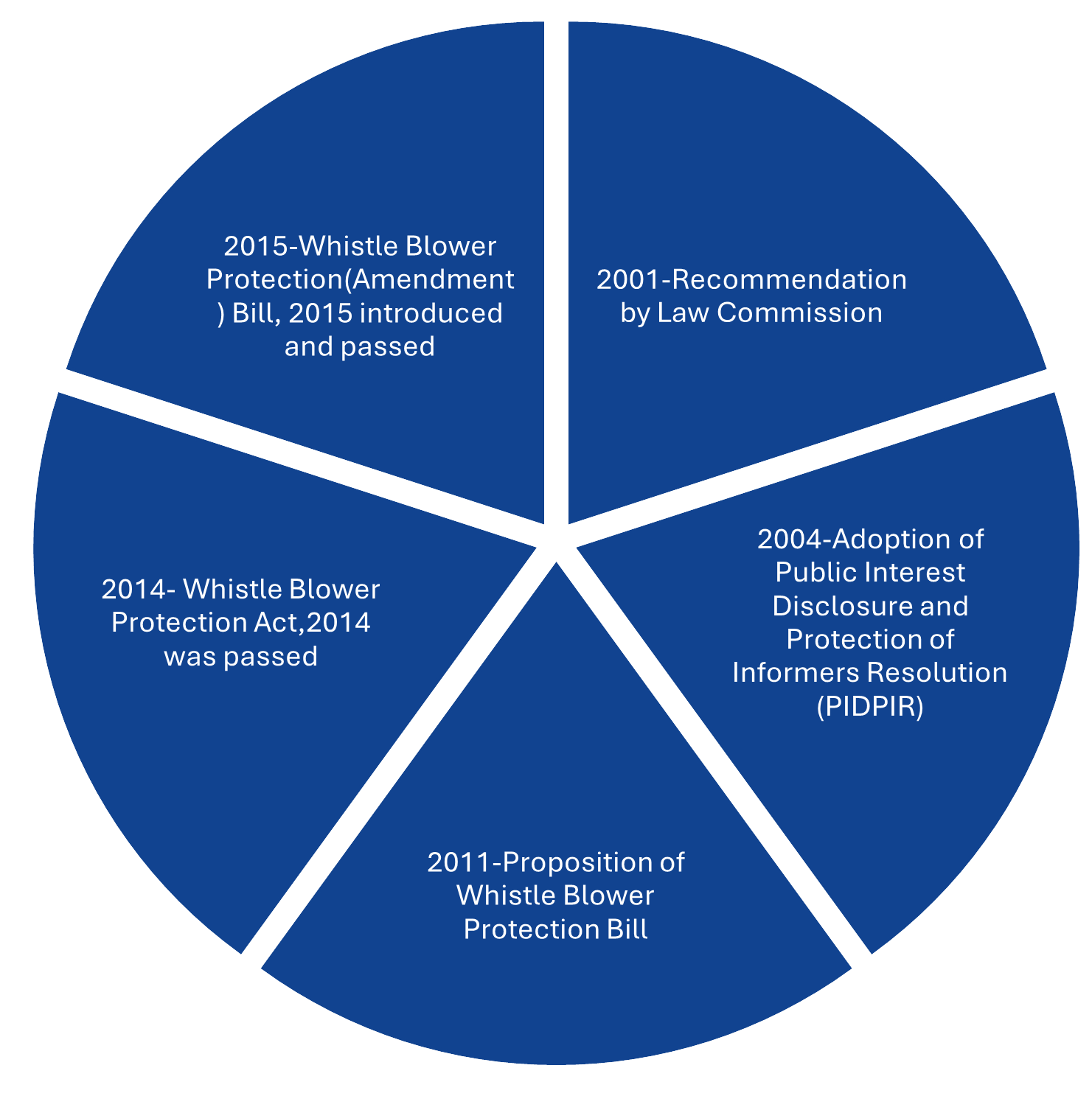Introduction:
Ralph Nader coined this phrase in 1970s. The word is linked to the use of a whistle to alert the public or a crowd about problems such as commission of a crime or the breaking of rules during a game. Whistleblowing means when a person, often an employee, reveals information about activity within a private or public organization that is deemed illegal, immoral, illicit, unsafe or fraudulent.
HOW INDIA GOT INTO WHISTLE BLOWING LAWS?

SALIENT FEATURES:
- The Act creates a framework to receive complaints about claims of corruption or deliberate abuse of authority or discretion made against any public servant, and to investigate or request an investigation into such disclosures.
- The Act also offers sufficient protections against victimisation of the individual filing the complaint.
- It permits anyone to disclose information in the public interest in front of a Competent Authority, including public employees. The law has defined many authorities that are competent in detail. For example, the Prime Minister is the competent authority to file a complaint against any union minister.
- The legislation expressly prohibits anonymous complaints and specifies that if the complainant fails to provide identification, a responsible body will not take any action.
- A complaint may be filed for a maximum of seven years.
- Exemptions: Personnel and officers of the Special Protection Group (SPG), established under The Special Protection Group statute of 1988, are exempt from the statute.
- Court of Appeal: Within sixty days after the date of the order, any individual who feels wronged by any decision made by the Competent Authority may file an appeal with the relevant High Court.
- Penalty:
- Person who negligently or malafidely reveals the identity of a complainant will be punishable with imprisonment for a term extending up to 3 years and a fine which may extend up to Rs 50,000. (Section 16)
- If the disclosure is done malafidely and knowingly that it was incorrect or false or misleading, the person will be punishable with imprisonment for a term extending up to 2 years and a fine extending up to Rs. 30,000. (Section 17)
- Annual Report: Every year, the Competent Authority compiles a comprehensive report detailing the outcomes of its operations and delivers it to the Federal or State Government. Subsequently, it is presented to every House of Parliament or State Legislature, as applicable.
- The Official Secrets legislation, 1923 is superseded by the Whistleblowers Act, which permits the complaint to disclose information in the public interest before a suitable authority even if doing so violates the later legislation but does not endanger national sovereignty.
- 2015 saw the introduction of an amendment bill that would prohibit whistleblowers from disclosing any information that is protected under the Official Secrets Act of 1923, even if doing so would enable them to expose instances of criminal activity, power abuse, or corruption. This weakens the 2014 Act’s core foundation.
LANDMARK CASES:
- Satyendra Dubey v State of Uttar Pradesh Dubey bought into due to the Aurangabad-Barachatti section of the NH2, a part of the “Golden quadrilateral Project” at Koderma in Jharkhand’s financial issues, which resulted in the suspension of three contractors. Dubey was shot dead on his way to Gaya when he was returning from Varanasi from a wedding. system failed him by not keeping his name anonymous as pleaded by him.
- Shanmugam Manjunath Case A marketing manager working for the Indian Oil Corporation (IOC) in Uttar Pradesh’s Lakhimpur Kheri. He uncovered the corruption going on in two petrol pumps in the district which were selling adulterated fuel, and he then made both shutdown and sealed. There were also surprise raids conducted on the pumps when they started operating again illegally after a month. He took the courage to stand up for what was right and had to bear the consequences for it also, Manjunath was killed by six gunshots in the town of Gola Gokarannath in Lakhimpur Kheri.
PROVISIONS OF WHISTLEBLOWER POLICY UNDER STATUTORY LAWS
Understanding key legislative terms is crucial for grasping the process:
| Companies Act,2013 (Section 177) | SEBI (LODR) Regulations,2015 |
|---|---|
| Every listed company or such class or classes of companies, shall establish a vigil mechanism for directors and employees to report genuine concerns in prescribed manner. (Clause 9) | Every listed entity shall constitute a qualified and independent audit committee to review the functioning of the whistle blower mechanism. The listed entity shall devise an effective vigil mechanism/whistle blower policy enabling stakeholders, including individual employees and their representative bodies, to freely communicate their concerns about illegal or unethical practices. |
| The vigil mechanism shall provide for adequate safeguards against victimisation of persons who use such mechanism and make provision for direct access to the chairperson of the Audit Committee in appropriate or exceptional cases.(Clause 10) Company shall disclose details of establishment of such mechanism on company’s website and on Board’s report, if any.(Proviso of Clause 10) |
The listed entity shall maintain a functional website containing the basic information about the listed entity and details of establishment of vigil mechanism/ WhistleBlower policy. (Reference to Regulation 4,18,22,46,62 and Schedule II) |
CONCLUSION
Over the times, several big commercial companies similar as Punjab National Bank, ICICI Bank, Satyam, Kingfisher, Enron have shocked the global frugality. While it’s a particular choice of the workers on their decision to blow the whoosh against illegal conditioning taking place in companies, it’s the duty of the Government to insure a healthy and defensive terrain to encourage and allow them to do so. Indeed, after nearly 8 times of enactment of act, it’s working without any emendations being made to it, which itself easily indicates dilemma over its operation.
Disclaimer
The information provided in this article is intended for general informational purposes only and should not be construed as legal advice. The content of this article is not intended to create and receipt of it does not constitute any relationship. Readers should not act upon this information without seeking professional legal counsel.


